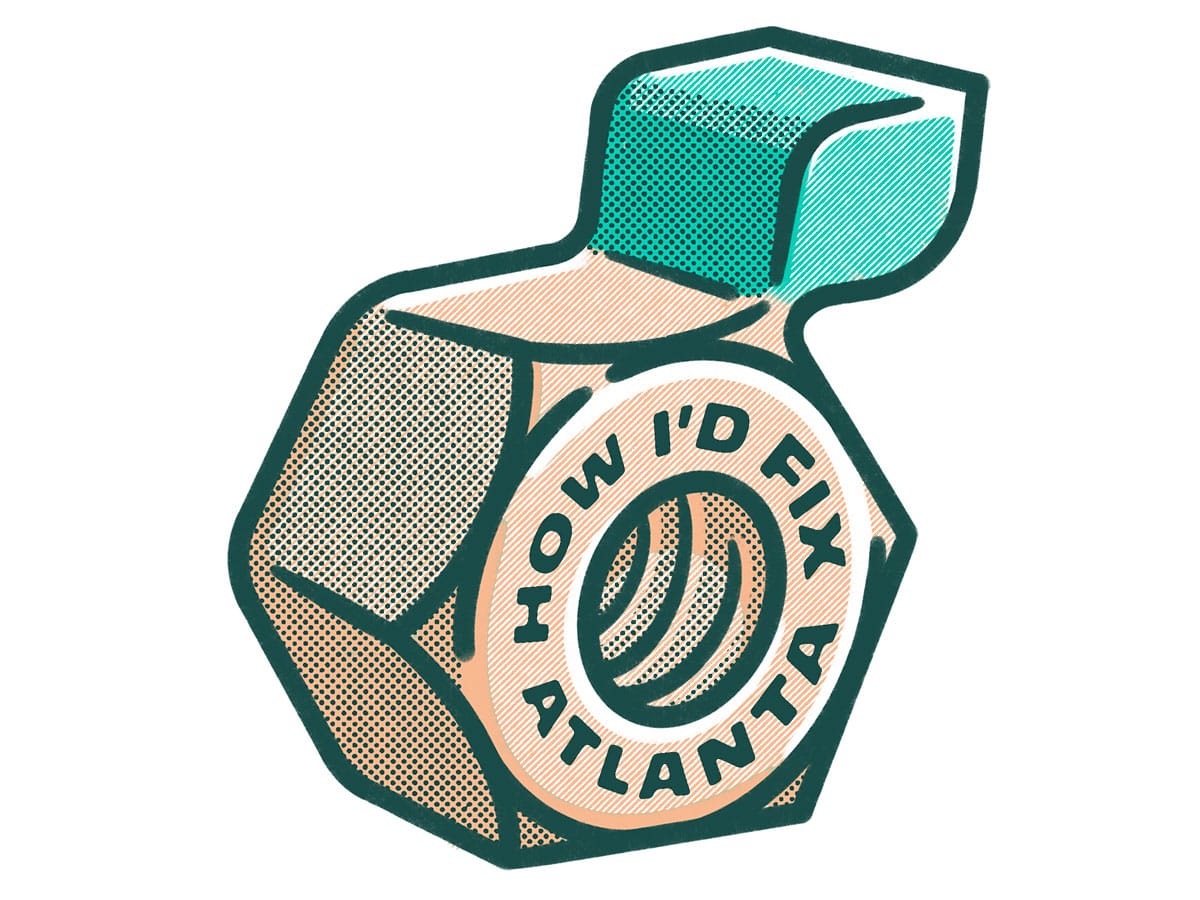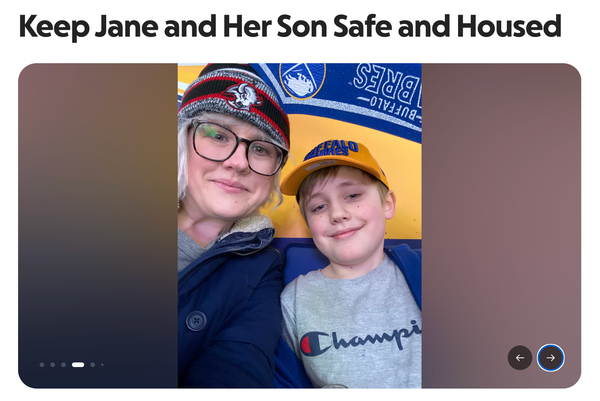How Brian Goldstone Would Fix Atlanta

Oh, hello. Maybe you've heard about Brian Goldstone's excellent new book, There is No Place for Us: Working and Homeless in America. It strikes me as precisely the kind of book How I'd Fix Atlanta folks would wanna read, and an important step toward improving the way we treat unhoused people in ATL and beyond. You should absolutely buy it, imho.
Of course, you don't have to take HIFA's word for it. Below is an excerpt from the book. And here's an explanation of that excerpt from Goldstone himself:
"There Is No Place for Us follows five families in Atlanta who are part of a rapidly growing, largely invisible population: people who work—often full-time, sometimes multiple jobs—and still cannot afford a home. In a city celebrated for its revitalization and booming economy, these families are the casualties of Atlanta’s renaissance—pushed out of their neighborhoods, and out of housing altogether, not despite the city’s growth but, in a very real sense, because of it. Their struggles reflect a crisis unfolding across the country, as the very people powering their cities’ prosperity through their labor are unable to remain housed in them. What emerges is a portrait of a nation where a low-wage job is homelessness waiting to happen.
The excerpt that follows takes place at Efficiency Lodge, an extended-stay hotel on Candler Road, where much of the book is set. Across the country, budget extended-stays like it have quietly become critical nodes in America’s new homelessness. They function as for-profit, commercial homeless shelters: charging extortionate weekly rates for substandard, often hazardous conditions, while offering none of the tenant protections that come with formal housing. Their proliferation is no accident. As more people are pushed out of the rental market, extended-stays have rushed in to exploit the gap, extracting maximum profit from those with nowhere else to go. Investors have taken notice. What was once considered a marginal, even disreputable backwater of the hotel industry has become a thriving investment frontier. Private equity firms like Blackstone and Starwood Capital have moved aggressively into the market, betting billions that this model will only grow.
James Baldwin once wrote about how 'extremely expensive' it is to be poor in America. There Is No Place for Us pushes this point further: showing how extremely lucrative all this precarity has become. At every turn, the families’ efforts to find stability are met by business models designed to both capitalize on and deepen their predicament. Nowhere is this more stark than at places like Efficiency Lodge, where what residents call the 'hotel trap' locks them in a cycle of insecurity: weekly rents devour their incomes, making it nearly impossible to save enough to leave. These hotels, described by one family in the book as 'expensive prisons,' offer little more than a holding cell for those shut out of the housing market—and turn misery itself into a source of profit."
On a chilly Saturday just after the new year, Efficiency Lodge was coming to life. Children finished breakfast and raced their bikes and scooters through the narrow parking lot. Grandmothers pushing strollers made their way to the closest bus stop, in need of diapers and groceries. A young woman carrying two industrial-size garbage bags full of dirty clothes squeezed herself through a hole in the razor-wire fence surrounding the property— a shortcut to the laundromat in a neighboring shopping plaza. And three hard-looking men in their early twenties tried to hide their late-morning blunt from Lisa, the hotel manager, who passed them with a grin and told them not to be acting stupid.
Lisa stopped in front of the room of a single middle-aged woman. “Hey, darlin’, you got my rent?” she asked in a thick southern drawl as the door opened a crack. The woman explained that the assistant manager, who’d been in charge while Lisa was away on vacation, had told her she could have a couple of extra days to get the money together. “Nope, that ain’t right,” Lisa said. “I’ll need the full amount by three o’clock.” The woman muttered something, but Lisa was already moving on to the next room. “Sorry, sweetie,” Lisa said loudly over her shoulder. “The bitch is back.”
When Lisa finished making her rounds on the front side of the extended-stay hotel, she proceeded to the back. At some point, the nickname “Buckhead”— a wealthy enclave located north of downtown Atlanta—had been given to the front of the property, where the office (and directly above it, Lisa’s own room) was located. Residents had dubbed the dingier, less surveilled rear side “Bankhead,” after a neighborhood on the city’s West Side. A group of boys on bicycles nearly plowed into Lisa as she rounded the corner. “Good morning, Ms. Lisa!” they yelled in unison. “Mornin’,” she replied. “Y’all watch where you’re riding.”

She noticed that one of the older boys had a Black & Mild tucked behind his ear. “Hey, get your ass over here,” she commanded him. She swept her dyed-brown hair off her forehead, her gray roots showing underneath. “What’s that?” She pointed to the boy’s ear.
“Nothin’,” he said meekly.
“Well, I’ll let you in on a little secret,” Lisa said. “Not only does that stuff stunt your growth but it’ll make your teeth yellow like mine. So yellow that they’ll fall out. And you ain’t gonna be able to kiss no girls, you know why?”
“Why?”
“Cuz you gonna smell like a damn ashtray.”
His friends giggled. As they rode away, Lisa told an eight-year-old named Mason to stay behind. She had a special fondness for the boy. His mother, Christina, was raising six small children on her own, surviving on food stamps, child support, and whatever else she could scrounge up. Mason couldn’t remember a time when they hadn’t lived at the hotel; his family’s three-hundred-square-foot room was the only home he’d known. Lisa, seeing that he was unable to zip his threadbare winter jacket, pulled him closer. She flipped his collar back and checked the label, figuring he’d need one at least two sizes bigger. “Tell your mama I’m gonna find you a new coat,” she said.
Lisa had started off as a desk clerk but got promoted after the previous manager refused to reside onsite any longer, fed up with the conditions. Efficiency Lodge sat on a notorious three-and-a-half-mile stretch of Candler Road running from Memorial Drive to Interstate 285. Just north of the intersection of Candler and Memorial were stylish cafés, a women’s liberal arts college, and Craftsman bungalows shaded by a lush tree canopy. South of Memorial there was scarcely any greenery at all. This was the Candler Road name-dropped in lyrics by Gucci Mane, Yung Mal (who would be charged with murder after a shooting near the hotel), and 21 Savage: a long, pockmarked thoroughfare comprising block after block of dialysis clinics, liquor stores, pawnshops, payday lenders, hair-braiding salons, plasma donation centers, twenty-four-hour daycares, storefront churches, and ramshackle motels. Like much of DeKalb County, the neighborhoods around Efficiency had been hit hard by the recession of 2008. The result was foreclosed homes, shuttered businesses, and deteriorating infrastructure. But whereas other parts of the county soon rebounded, inaugurating a surge of new development, Candler Road and its environs remained stuck in a period of decline.
Increasingly in Atlanta, there were two kinds of poor Black neighborhoods: those where property values were rising and investors were buying up land, waiting for the inevitable transformation, and those like the area around Efficiency, where people usually ended up after being pushed out of the gentrifying neighborhoods. These spaces, hollowed out by what the geographer Ruth Wilson Gilmore has referred to as “organized abandonment,” did not simply coexist alongside newly or soon-to-be gentrified segments of the city. They were actively generated by them. Although they appeared worlds apart, these areas were intimately connected, like a balloon squeezed at one end. Candler Road was not a deviation from the booming new Atlanta but another by-product of it. One did not exist without the other.
Her morning rounds now completed, Lisa returned to the office and found Celeste Walker waiting to pay her rent. “Always on time,” Lisa said. “If everyone was like you, my job would be a hell of a lot easier.” She unlocked the office’s inner door and walked around to the front desk, facing Celeste from behind a thick pane of bulletproof glass.
“Well,” Celeste replied playfully, sliding her cash under the metal slot, “you let me know when you’re ready to bring me on as an assistant manager.”

Five weeks earlier, after a sleepless night in her cherry-red Dodge Durango, Celeste had tried to get a room at the Efficiency Lodge in Forest Park—the chain had eleven locations in Atlanta—but she arrived too late: somebody had just snagged the last room. The manager suggested that Celeste try the Efficiency on Candler Road; since the hotel didn’t accept reservations, the best approach, she said, was to inquire in person. Twenty minutes later, Celeste arrived at the extended-stay, parking near a door with office stenciled in fading block letters over it and a small sign reading Smile, You’re On Camera pasted to the adjoining window. It was almost seven, and the woman who greeted her was preparing to leave. Before Celeste could get the words out, Lisa gruffly said she had no rooms available. Her only empty unit had been vacated that morning, and she couldn’t rent it out until it had been cleaned. “It ain’t pretty,” she said.
Celeste was unfazed. What if she cleaned the room herself? she asked. Lisa looked at her more closely, and then she sighed. The rate, she said, was $257 a week, due each Saturday by noon. “And if that’s too much for you,” she added, preempting a common complaint, “you’re more than welcome to go to one of the other places around here.” There were nearly a dozen extended-stays in the vicinity, but Lisa knew as well as Celeste that Efficiency was the cheapest. Gulf American Inns across the street, for instance, cost twice as much, as Celeste had discovered that afternoon while calling around to budget hotels. The place was booked solid. “No, ma’am, that’ll be fine,” said Celeste. “I’ll take it.” She and her children—Micah was six, Jalen was fourteen, and Nyah was sixteen—spent the next few hours scrubbing the filthy room and kitchenette from top to bottom. The following afternoon, Lisa stopped by to check on them and, shocked that their room was spotless, remarked not entirely in jest that Celeste should come work for her.
Now, in the office, Lisa gestured toward her assistant, who was outside smoking a cigarette. Her low opinion of the younger woman was hardly a secret. “Believe me,” she said. “I’d hire you if I could.” Confident and articulate, Celeste had a way of making herself indispensable wherever she went. She carried herself with an air of invulnerability, which might have been off-putting were it not for her charm and sense of humor. Lisa liked her. And the feeling was mutual: Lisa reminded Celeste of her mom, who was “ghetto white,” as Celeste put it, and had a similar “sweet but don’t fuck with me” demeanor. Born and raised in Cabbagetown, back when the Atlanta neighborhood was still poor and working class, Lisa had worked for more than two decades as a bartender and, before that, as a waitress at Waffle House. She had now been at Efficiency for nine years. “I’ve been down that road myself,” she’d told Celeste, referring to the financial insecurity experienced by most of the hotel’s residents. “I wasn’t given no silver spoon.” The only reason she had a place to live, she’d said, was because her job included free accommodations.
“All right, girl,” said Celeste, turning to leave the office. “Just promise you won’t forget about me.”
From the book THERE IS NO PLACE FOR US: Working and Homeless in America by Brian Goldstone. Copyright © 2025 by Brian Goldstone. Published in the United States by Crown, an imprint of the Crown Publishing Group, a division of Penguin Random House LLC.
How I'd Fix Atlanta is an essay series by ATLiens for ATL. In each of these pieces, a thoughtful human argues for one way we could make our city better. Sometimes the ideas are serious. Other times? A little more lighthearted. From infrastructure to food trucks, public transit to wildflowers, nothing is off limits.
How I’d Fix Atlanta was created by Austin L. Ray. It's a free newsletter sent on a Thursday of most months. It's also an annual zine that costs money. Sometimes it’s a performance on a stage. Other times, it’s a fundraiser. It's always a bunch of stickers. Occasionally it's featured on a podcast or a legendary WABE show. How I’d Fix Atlanta is large, it contains multitudes.
Each writer is paid $800 for their essay. Wanna help support the series? Reply to this email to learn more about sponsorship opportunities.





